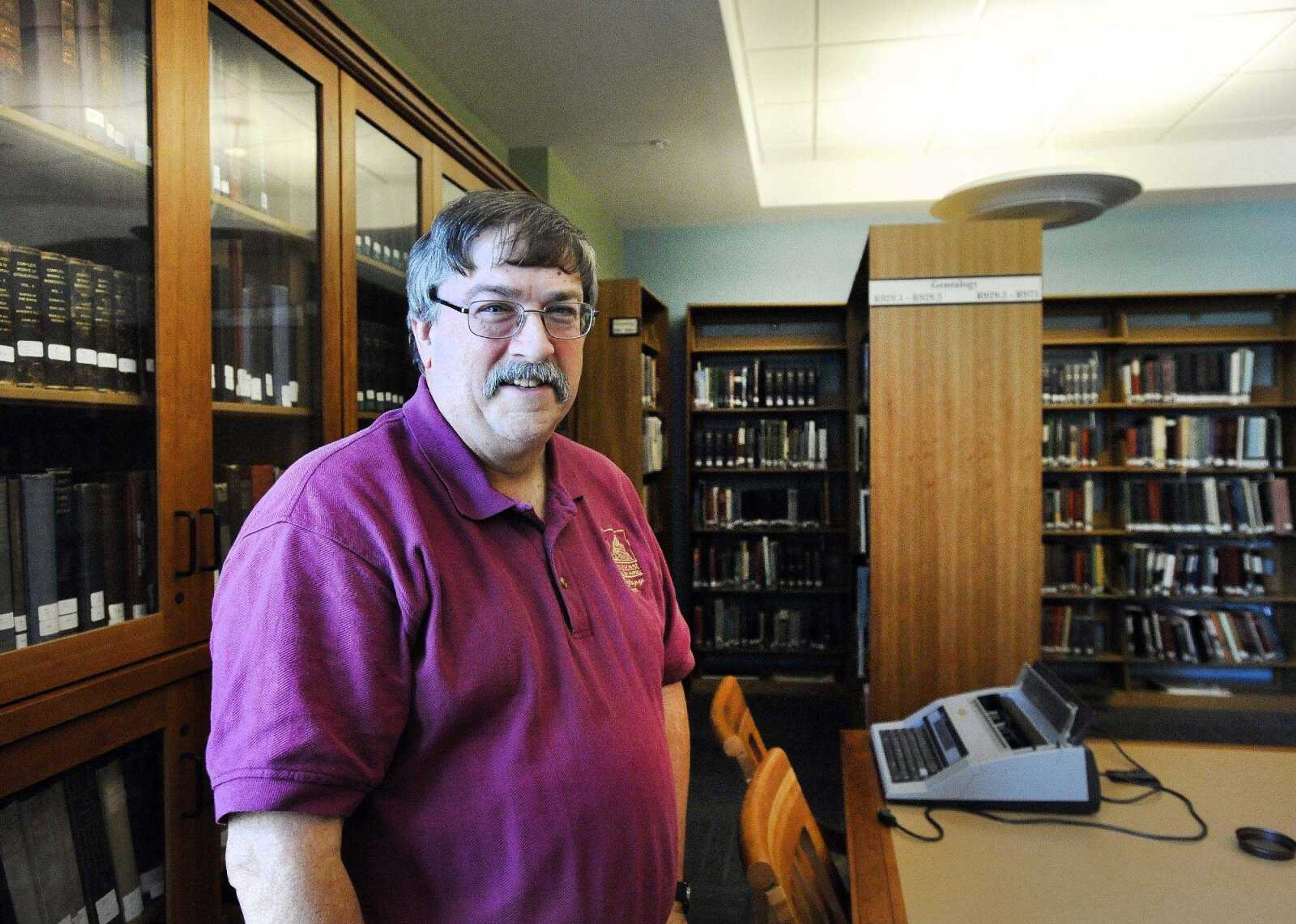Genealogy series has practical focus
Bill Eddleman is gearing up to provide a series of genealogy workshops, to teach attendees the basics of one of his passions. Eddleman, who has been involved with the Cape Girardeau County Genealogical Society since 1991, said this series is an attempt to reach new people...
Note: This story has been updated to reflect the correct name of the society.
Bill Eddleman is gearing up to provide a series of genealogy workshops, to teach attendees the basics of one of his passions.
Eddleman, who has been involved with the Cape Girardeau County Genealogical Society since 1991, said this series is an attempt to reach new people.
"People can to go the whole series or one session, and still get something out of it," Eddleman said. "Our hope is, people will join the group if they have local ancestry, or if they want to learn techniques."
Dues for the group are $10 for a year's individual membership, Eddleman said, and $15 if a member wants a hard copy of the quarterly newsletter.
That's unchanged since about 1980, Eddleman said.
"Our membership peaked at about 200, and now we're down to about 70," Eddleman said. "We can't do much unless we get more critical mass."
The group used to do record transcriptions and provide other services, Eddleman said, but with the present lack of membership, that's not possible.
So, he said, he hopes this workshop series helps raise awareness of the group and its members' work.
"We're celebrating our 50th anniversary this year too," Eddleman said, and in May, the group will hold a symposium at the Cape Girardeau County History Center in Jackson.
The first installment of the genealogy series will be on the basics, Eddleman said, and how to get started.
How to stay organized and conduct interviews, keep focused, and keep records of research will also be covered, Eddleman said.
The session will go from 10 to 11:30 a.m. Saturday, Feb. 22, at the Public Library, 711 N. Clark St. in Cape Girardeau.
Registration is required for this free event. Visit capelibrary.org/calendar, call (573) 334-5279 ext. 113, or register in person at the library.
Future sessions include:
- Online Resources: Free and Subscription: Many genealogical records have become available online in the last 20 years. Learn how to find and use those records that are free, and what you can get from subscription services. In addition, learn about the limitations of online records.
- Censuses: The U. S. Federal Census, conducted every 10 years, is a key resource used for genealogy. Learn about the information found on censuses and how that changed through 1790-1940, special census schedules (mortality, slave, manufacturing, agricultural, and others), a search strategy, pitfalls of census research, and using the neighbors to assist research. The presentation will also include information about census substitutes.
- Vital Records (birth, death, marriage, church, cemeteries): Learn where to locate this information, how the information sources vary from place to place, and pitfalls of each type of source for this information. Also included: basics of cemetery research.
- Land Records: Obtaining First Title: Learn about land grants, federal land sales, military bounty land, and many other ways to study records on first title. This presentation will also include an overview of how land parcels are described and delineated (metes and bounds, U. S. Public Land System, and other details).
- Land Records: Transfers: Often records involving land transfers after the original title holder require a deeper level of understanding to use them effectively. An estimated 80% of men owned land during the 19th century, and deeds often document relationships. This is an overview of locating the information researchers can find, including other records.
- Court Records: Learn about the different types of courts and the types of records they created that can be of genealogical interest. Included will be where to locate court records, where to find laws regulating these courts, and the bases for the legal systems. Examples will illustrate use of court records to document relationships.
- Probate: As is true today, upon the death of a property owner, there had to be legal methods to distribute the property to heirs. This presentation will discuss the difference between testate and intestate estates, laws relating to inheritance, documents generated by the probate process and what they mean, and the role of courts and court records in probate.
- Newspapers: Learn about free and subscription services to find newspapers, how to get records that appeared in newspapers, and what likely records in newspapers.
- Using DNA: Structure and function of DNA, different types of DNA (Y-DNA, mitrochrondrial, and autosomal) and when they are useful for different questions, the basics of testing and different companies, and the basics of how to use the data once you have results.
- Using Manuscript Collections: Many family historians fail to use manuscript collections in their research, either because they are unaware of them or think they are difficult to find. We will summarize the documents to locate in manuscript collections and how that information can help. Discussion will include a method for locating a family in archival collections, and how to access the collections. Examples will emphasize Missouri families and collections.
- Putting it All Together: How to Write Your Family History: All of that research does not do much good unless it is placed in the hands of your family. Among other things, this session will include how determining your purpose in writing, ways to present the information (including numbering schemes), software you can use, aids to better writing, how to cite sources, and methods you can use to publish the results.
Connect with the Southeast Missourian Newsroom:
For corrections to this story or other insights for the editor, click here. To submit a letter to the editor, click here. To learn about the Southeast Missourian’s AI Policy, click here.










